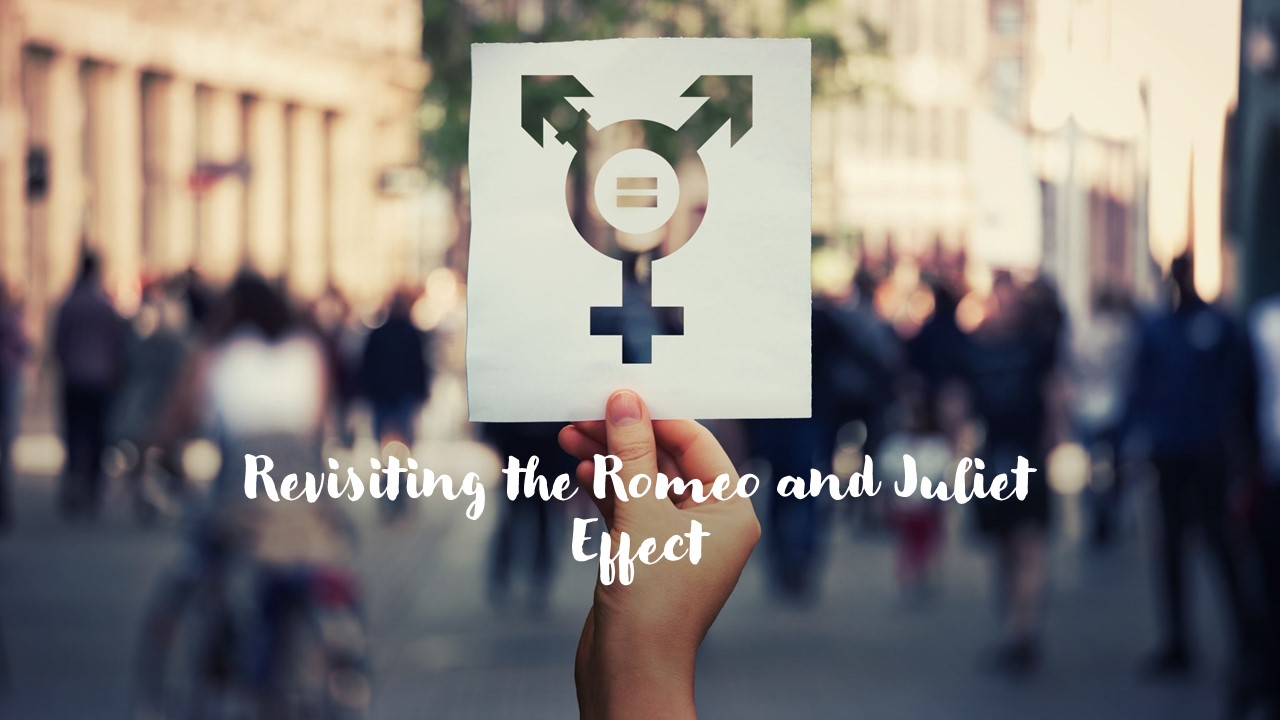Authors: Victor Karandashev and Ernest Light
Contemporary young men and women appear to feel autonomy in their selection of romantic partners. However, individuals’ social networks and family members seem to substantially influence their romantic preferences.
Researchers have explored the Romeo and Juliet Effect on romantic love feelings (Driscoll et al., 1972). They referred to the Romeo and Juliet effect as fact for many years following this study.
We described the Romeo and Juliet effect in another article. Does this effect actually work? Let us review several other studies.
Inconsistencies in the Romeo and Juliet Effect
Further studies have discovered a more complex influence of the social network and family on romantic feelings than earlier research showed (Driscoll et al., 1972; Felmlee, 2001; Parks et al., 1983; Sprecher, 2011; Sprecher & Felmlee, 1992).
For example, researchers have shown that expecting approval from one’s own friends and approval from a partner’s parents increases relationship stability. The author of the study (Felmlee, 2001) explains this finding that friends and relatives are better able to predict the prospects of a relationship than the partners themselves. Friends and relatives do not perceive the partner through “rose-colored glasses.” They are more realistic in their assessment than the person involved in the relationship.
It was also found that the expectation of approval from friends is often more important than actual approval for relationship stability. The author believes that this study confirms the Romeo and Juliet effect. Parental resistance to their children’s choices and disapproval of others often brings couples closer together rather than separating them. But this only happens when there is some support from friends. (Felmlee, 2001).
Despite the inconsistent results, popular literature, textbooks, and articles have extensively quoted the scientific myth of the Romeo and Juliet effect for many years (Sinclair et al., 2014).
The Social Network Effect on Love Feelings
One problem with the inconsistency of the results was that subsequent studies did not use the original measurement scales. Therefore, in the early 2000s, other researchers attempted to retest the Romeo and Juliet effect by examining the effect of social environment opinion on romantic relationships. They used the same measurement scales as in the original 1972 paper and repeated the data analysis, but they found no evidence of the Romeo and Juliet effect (Sinclair et al., 2014).
Rather, they found that the opposite is more correct: consistent with the social network effect, young people who experienced high pressure and low levels of approval from their social network reported low relationship quality. Conversely, the more approval and less resistance they received from their friends and relatives, the more they felt feelings of love, loyalty, and trust towards their partner.
Some studies show that the opinion of friends carries more weight than the opinion of parents. At least this is true in Western cultures (Etcheverry & Agnew, 2004; MacDonald & Jessica, 2006). Similarly, other scholars have suggested that the approval of a certain part of the social network may buffer disapproval or compensate for other sources of negativity (Wright & Sinclair, 2012).
Thus, the Romeo and Juliet effect, if it exists, is not due to parental disapproval but rather due to the influence of the person’s social network of others. Even in Shakespeare’s Romeo and Juliet, the friar and nanny played an important role in their relationship.
And the Romeo and Juliet effect may have culturally different effects, in particular, in individualistic and collectivistic societies.
Recent Advancements in the Study of Family Influences on Love
The virtual symposium “Familial Influences on Love,” recently organized by The Love Consortium, was a very important advancement in the studies of how family and other people from social network affect our love relationships.
The speakers Jessica Stern, Princeton Chee, Beverley Fehr, and Emmy Reilly as well as a wonderful moderator Amrisha Vaish shared their expertise with community of love scholars.
References
Driscoll, R., Davis, K. E., & Lipetz, M. E. (1972). Parental interference and romantic love: The Romeo and Juliet effect. Journal of Personality and Social Psychology, 24, 1–10.
Etcheverry, P. E., & Agnew, C. R. (2004). Subjective norms and the prediction of romantic relationship state and fate. Personal Relationships, 11(4), 409-428.
Felmlee, D. H. (2001). No couple is an island: A social network perspective on dyadic stability. Social Forces, 79(4), 1259-1287.
MacDonald, G., & Jessica, M. (2006). Family approval as a constraint in dependency regulation: Evidence from Australia and Indonesia. Personal Relationships, 13(2), 183-194.
Parks, M. R., Stan, C. M., & Eggert, L. L. (1983). Romantic involvement and social network involvement. Social Psychology Quarterly, 46, 116-131.
Sinclair, H. C., Hood, K. B., & Wright, B. L. (2014). Revisiting the Romeo and Juliet effect (Driscoll, Davis, & Lipetz, 1972): Reexamining the links between social network opinions and romantic relationship outcomes. Social Psychology, 45(3), 170–178.
Sinclair, H. C., Felmlee, D., Sprecher, S., & Wright, B. L. (2015). Don’t tell me who I can’t love: A multimethod investigation of social network and reactance effects on romantic relationships. Social Psychology Quarterly, 78(1), 77-99.
Sprecher, S. (2011). The influence of social networks on romantic relationships: Through the lens of the social network. Personal Relationships, 18(4), 630-644.
Sprecher S., Felmlee D. (1992). The Influence of Parents and Friends on the Quality and Stability of Romantic Relationships: A Three-Wave Longitudinal Investigation. Journal of Marriage and the Family, 54, (4), 888—900.Wright, B. L., & Sinclair, H. C. (2012). Pulling the strings: Effects of friend and parent opinions on dating choices. Personal Relationships, 19(4), 743-758.
